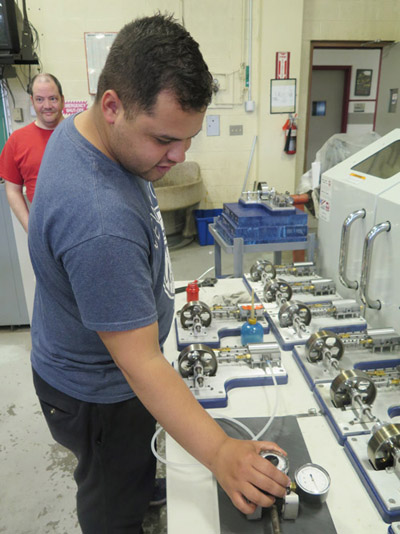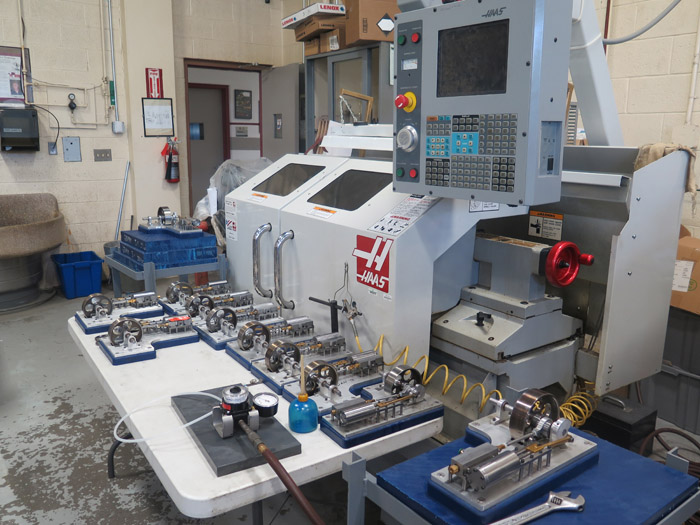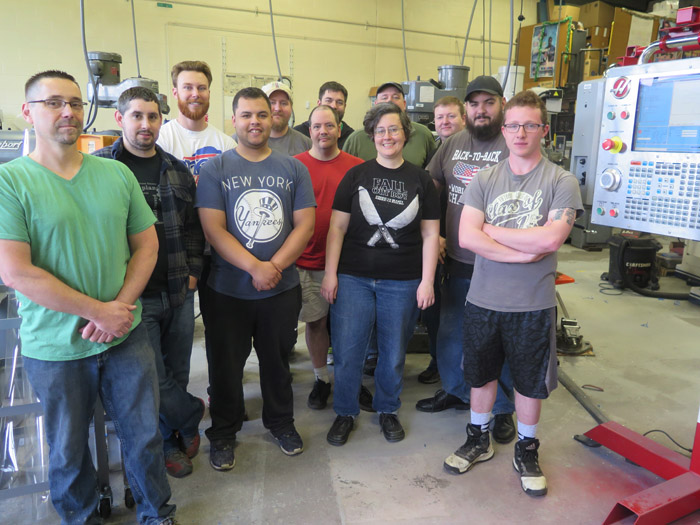By Mark Frost, Chronicle Editor
Another 11 adults were set to graduate Tuesday this week from a customized seven-month, 500-hour machine tool course at the Southern Adirondack Education Center — better known as BOCES, on Dix Avenue in Hudson Falls.
Better jobs are the immediate prospect.
“This is very much a program driven by the local employers,” says course instructor Jason Viele.
“They say we can’t get enough people that have the skills.”
Employers help plan it; $15-$16 an hour to start; $22-$25 with experience.
Local employers like Sinclair International and Doty Machine Works participate in the program, which is operated in conjunction with the Saratoga-Warren-Washington Workforce Development Board.
“It gives you the fundamental skills to take an entry level job,” Mr. Viele said. “It’s designed to get you into the trade — and then you can go any number of places and get the specialized training you need.”
He said, “Most of the shops will start you at $15-$16” an hour. He said that with experience, the average wage is $22 to $25.
Mr. Viele, himself a 1991 BOCES graduate, speaks with knowledge. By day, he’s the production manager at Sinclair International, a paper machinery business in Queensbury that he says “is booming. I’ve had to hire two students this year.”
He said that a few years ago some people he hired from the program lacked some of what he was looking for. So he said he decided, “I’ll put my money where my mouth is” and offered to teach it himself.

He’s in his second year as the instructor.
Like Mr. Viele, most of the students already have full-time jobs during the day, then attended the course Mondays through Thursdays from 5 to 9 in the evenings and every other Saturday, 8 to 4:30.
Mr. Viele quips, “My girlfriend and my dog hate me all winter because I’m either here or at work.”
“We only hate you on Saturday,” joked Adam Colvin, 31, of Hudson Falls.
Students’ full-time jobs, plus course
Mr. Viele says there’s no question about the participating students’ motivation.
Mr. Colvin said, “I get up at 4 in the morning” for his day job, and then here in the evenings. He said his days aren’t done “until 10 at night.”
P.J. Cancelliere, 26, of Glens Falls, said, “I knew enough from the class to get a foothold. I wasn’t lost in the dark.”
“It teaches all of your basics, get all the fundamentals down,” said student Tom Kilduff, 40, of Hudson Falls. “From there, keep building on your skills.”
Student Jeff Czajkowski, 43, of South Glens Falls, said that once you get experience, “if you know your stuff, you can pretty much name your own price.”

Student Allison Hewett, 39, of Glens Falls works full-time at Genpak. “My job is moving out of town at the end of the month and I’m not moving with it,” because she’s a hard-core “northeasterner.”
She said Genpak is providing a severance and “I like working with my hands. I’ve been doing a lot of computer-based work. I love the programming. I like the technology, the computer work” but is pleased now to be learning how to “actually produce the piece instead of just spreadsheets.”
The course’s student project was making the parts and building a small working engine. Last Saturday — the final day of class before graduation — the students competed in the machine job to see whose engine would function at the least amount of air pressure.
Course costs $3,400, but there’s help
“I love that it’s a practical project,” Ms. Hewett said. We’re not just leaving with a list of skills. We’re building a working engine. I’m giving it to my dad.”
Mr. Viele said, “Just about every single part except for the nuts and bolts they made themselves.”
The course costs $3,400, but there are grants that can offset much of that.
P.J. Cancelliere said, “If you make under $20 an hour, the majority of it gets paid for by the county.”
Mr. Viele says it’s critical that new machinists enter the field. He says, “For four guys retiring there’s one new guy starting in the trade.”
“I have a 72 year old guy who works for me. We can’t lose that knowledge. It’s important to get your guys in there to soak it up before they’re gone.”

At the same time, Mr. Viele said the new machinists bring fresh perspective and energy to the job, and the course purposely familiarizes them with new technology. The veteran workers then learn from them.
“We want to give you an idea of what the future is going forward,” said Mr. Viele.
He said he wants the students to be able to talk to employers and to salesmen and personnel in the tool room.
He said the students hear the exact same presentations that tradespeople give at employers like the Watervliet Arsenal.
He said the program adjusts to employer input. “They’ll say ‘The guys that you sent were strong in this area. They need to be stronger in this area.’ Employer feedback is important.”
It’s a serious regimen, but Mr. Viele brings the students coffee on Saturdays and tries to factor in fun.
It’s no walk in the park, though. “If you can make it six months here,” he said, “you’re doing alright.”
Copyright © 2017 Lone Oak Publishing Co., Inc. All Rights Reserved.
 Glens Falls Chronicle Serving the Glens Falls/Lake George region; Warren, Washington and northern Saratoga counties since 1980
Glens Falls Chronicle Serving the Glens Falls/Lake George region; Warren, Washington and northern Saratoga counties since 1980


